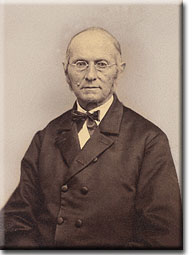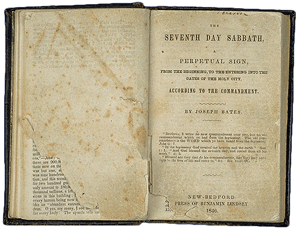Joseph Bates
1792-1872

Perhaps there was no more unlikely preacher of the Seventh-day Adventist
Church than Joseph Bates. Born in Rochester, Massachusetts, when he was
young his family moved to Fairhaven, Massachusetts, a port city, where he
became fascinated with the sea. He set out from Fairhaven at the age of
15 as a cabin boy. He experienced shipwreck, capture, and forced service
in the British Navy, and was for two-and-a-half years a prisoner of war
in England, being released in 1815. Bates eventually served as captain
of his own ship, beginning in 1820. In 1821 he gave up smoking and chewing
tobacco, as well as the use of profane language. He later quit using tea
and coffee, and in 1843 became a vegetarian. Bates retired from the sea in
1827, with a small fortune for the time, of $11,000. During his years at
sea he was converted, and helped found the Fairhaven Christian church.
After his retirement at age 35, Bates became associated with several reforms,
including temperance and antislavery. In 1839 he accepted the second advent
preaching of William Miller, and became an active and successful Millerite
preacher. He eventually invested all of his money in the advent movement.
Bates experienced the 1844 disappointment without losing his faith. In 1845
he read a T. M. Prebletract on the Sabbath, published in Nashua, near
Washington, New Hampshire. Bates traveled there to study for himself.
Upon his return to Fairhaven, he met a friend, Captain Hall, at the old
bridge approach. Hall asked him: "What's the news, Captain Bates?" His
reply was: "The news is that the seventh day is the Sabbath." Hall became
a convert to the Sabbath as well.

The next year, 1846, Bates wrote a tract on the subject of the Bible Sabbath.
This tract came to the attention of James and Ellen White, around the time of
their marriage in August of that year. They accepted the seventh-day Sabbath
as a result of their study. It is interesting to note that Bates argued in
the tract for beginning the Sabbath at 6 p.m. Friday. For more than ten years,
many Sabbathkeepers, including the Whites, began the Sabbath at 6 p.m. Other
Adventists kept it from sunrise, sunset, or midnight. In 1855 James White
asked J. N. Andrews to make a study of the Bible on the subject. His paper
was presented at a meeting in Battle Creek, in November. His conclusion
supported sunset. After the meeting, Ellen White had a vision confirming
the result of his Bible study, and unity on the subject was gained.
Joseph Bates was often the chairman at the "Sabbath conferences" of 1848-1850.
He became more closely associated with the Whites at that time. Earlier, he had
written about his efforts to verify Ellen White's visionary experiences for
himself:
"I therefore sought opportunities in presence of others, when her mind
seemed freed from excitement, (out of meeting) to question, and cross
question her, and her friends which accompanied her, especially her elder
sister, to get if possible at the truth. . . . I have seen her in vision a
number of times, and also in Topsham, Me., and those who were present during
some of these exciting scenes know well with what interest and intensity I
listened to every word, and watched every move to detect deception, or mesmeric
influence. And I thank God for the opportunity I have had with others to
witness these things. I can now confidently speak for myself."--
A Word to
the "Little Flock," p. 21.
Joseph Bates is considered one of the co-founders of the Seventh-day
Adventist Church, along with James and Ellen White. When he left the
sea, he continued his travels to many places, including Battle Creek,
where he won the first convert there. The year before he died he preached
at least 100 times. He died at the age of 80 at the Health Reform Institute
in Battle Creek, and is buried at Monterey, Michigan.